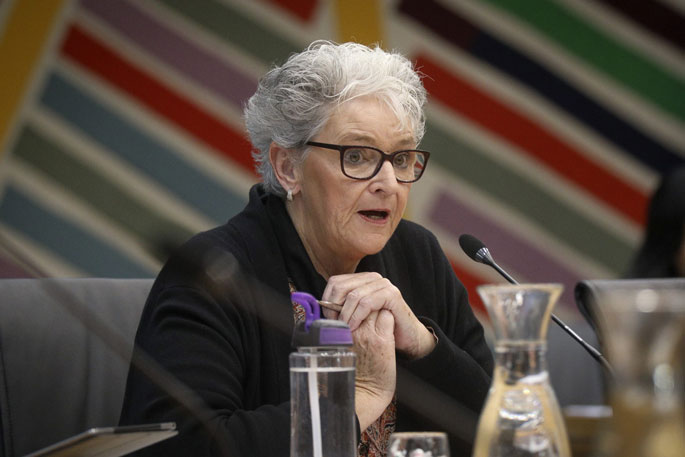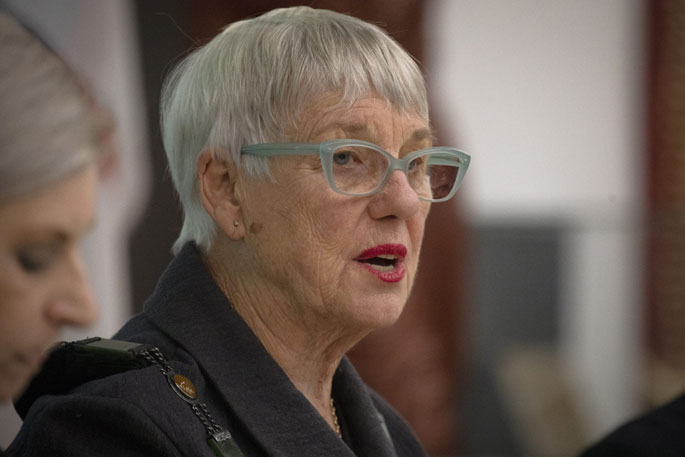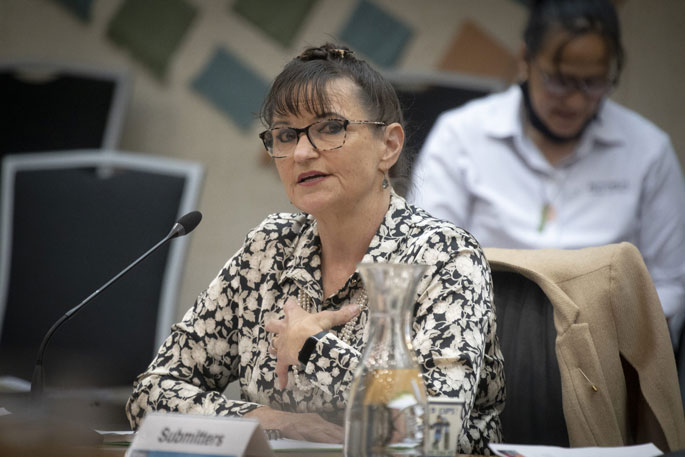The chief executive of Rotorua council's iwi partnership group says the council dropped its final ward structure 'out of thin air”.
The comment was made by Te Tatau o Te Arawa's Jude Pani at the Local Government Commission's hearing on Rotorua Lakes Council's representation review on Wednesday.
It follows the council's adoption of a ward structure with one Māori ward seat, one general ward seat and eight at-large seats.
Rotorua mayor Steve Chadwick says Te Tatau were "informed" of the model the night before it went public.
The Commission heard appellants to the council's decision and can overturn it. The council's pursuit of a law change to allow a model with three Māori ward seats and three general ward seats and four at-large seats in the district is a separate process.
Pani's presentation to the four commissioners stated there was a lack of consultation on the final model with both Te Tatau and the wider community and 'too much emphasis on parity of voting”.
'It's like all of a sudden, the goal post changed and what we were looking at … and what we thought we were participating in had gone altogether.
'The final proposal dropped out of thin air as far as Te Tatau was concerned.
'All of a sudden, we've got this ‘parity of voting'. I've listened back to the [submission hearings and] I cannot find emphasis ever put on parity of voting.”
She said Te Arawa whanui understood maximising seats at the council table came at the cost of reducing the number of candidates people on the Māori roll could vote for, but it was worth the sacrifice.
'[It's] decision-making power they wanted, not in individual voting.”
Pani said it was important discussions of equity restoration centred on the viewpoint of those whose equity was being restored.
She said potential Māori ward candidates had told her they would not stand in the Māori ward if it was only one seat as the weight of responsibility to represent all Māori in the district alone would be too much.
Appellants Mike McVicker, Reynold Macpherson and David McPherson also argued for a three Māori ward seat, seven general ward seat model.
McVicker said democracy had been 'totally disregarded” and 'race-based” wards could 'only divide our community”.
'One can only conclude the council gives priority to the demand for co-governance rather than democracy.”
He said Māori already had a 'very high level of representation” on the Rotorua district council.
Macpherson said the council's interim model violated citizens' democratic and civil rights to equal suffrage as it gave people on the Māori roll 2.6 times the voting power of those on the general ward, as the population of the Māori ward is smaller than the general ward.
Commissioner Bonita Bigham asked Macpherson if the council was taking away anyone's right to vote, which was one understanding of equal suffrage, and Macpherson said votes had to have the same value.
Macpherson said the one Māori ward seat model had also come as a surprise to him.
'There was no prior warning or discussion.”
Three appellants - Rotorua Rural Community Board chairwoman Shirley Trumper, Alan Wills, and Federated Farmers representatives Colin Guyton and Shaun Hazelton - argued for the inclusion of a rural ward.
 Rotorua Rural Community Board chairwoman Shirley Trumper. Photo / Andrew Warner / Rotorua Daily Post.
Rotorua Rural Community Board chairwoman Shirley Trumper. Photo / Andrew Warner / Rotorua Daily Post.
Trumper said there was a gap in knowledge on the council around rural issues which could only be filled with a rural ward councillor who had the lived experience from the rural community.
She said it was difficult for someone to be elected to the council from the rural community as the population was small compared to the urban population.
Hazelton said the Rural Community Board should be an additional resource, 'not a substitute for a councillor”.
He believed there had been a decline in decision-making supporting the rural community because of the lack of a rural voice at the council table, and said Federated Farmers members in Rotorua felt 'overlooked and misunderstood”.
Appellant Justin Adams told commissioners there should be an increase in the number of councillors from 10.
 Rotorua mayor Steve Chadwick. Photo / Andrew Warner / Rotorua Daily Post.
Rotorua mayor Steve Chadwick. Photo / Andrew Warner / Rotorua Daily Post.
Rotorua mayor Steve Chadwick, deputy mayor Dave Donaldson, and councillor Mercia Yates provided right of reply for the council, along with district leadership and democracy deputy chief executive Oonagh Hopkins and council lawyer Lachlan Muldowney.
Donaldson said the rural board was 'not a broken model”, was effective, and there was already a rurally-based councillor – Fisher Wang.
He said representation feedback was 'overwhelmingly in favour of retaining 10 councillors”.
Hopkins said the representation review process was a 'very thorough and robust” one, and as it was done in lockdowns was difficult, but the council made every effort to address the community.
She said after representation review hearings and a closed-door elected member forum, officials were directed to 'consider feedback around parity and equality”.
That, along with legal opinion, resulted in the one Māori ward seat model that was 'lawful and met parity requirements”.
Muldowney said the concept of parity 'really came through the consultation process”.
Yates said Ngāti Whakaue, in its submission, 'insisted that parity come into it as well”.
Chadwick said she had met with Te Tatau o Te Arawa chairman Te Taru White the night before a committee meeting where the model was first discussed in public.
'They were informed.”
She said Ngāti Whakaue's submission on the representation review and call for voter parity was a 'lightbulb moment”.
'That was when the conversation changed.”
Donaldson said Ngāti Whakaue 'need to be given weight” as they were mana whenua of the township and said Te Tatau o Te Arawa, as māngai (spokespeople) for the wider Māori and iwi population, 'deferred” to Ngāti Whakaue.
Bigham asked if that was true as Te Tatau had not stated that in its written or verbal appeal.
She also asked if the council believed the Commision should 'elevate Ngāti Whakaue's voice for the township over Te Tatau o Te Arawa's for the rohe”, and Yates said the council could not determine that.
Bigham said: 'But that's what your reflection of the final proposal meant, that one seat [model] was based on Ngāti Whakaue wanting parity – but we've heard a different side of the story from Te Tatau”.
The Commission will make a final decision on Rotorua's governance model by April 10.
-Local Democracy Reporting is Public Interest Journalism funded through NZ On Air




1 comment
Disgraceful
Posted on 28-03-2022 09:51 | By Let's get real
This discussion shouldn't be happening at all... Are we no longer entitled to have the best possible person for the job of managing our cities...? The days of the ward system should be over in favour of all councillors being held accountable for the whole city and being responsible to all ratepayers. I'm extremely disappointed that a small group are singularly focused on dividing the country by racial identity. I thought that the world was moving past the days of race-based ideology and into an environment of enlightened thinking.
Leave a Comment
You must be logged in to make a comment.